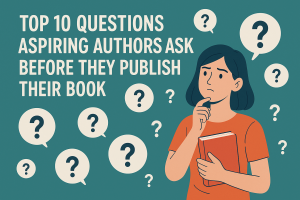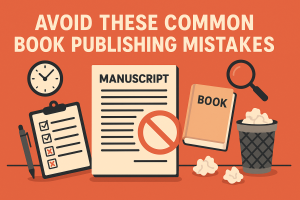Writing a book can feel like an enormous challenge. Whether your dream is to share your life story, craft an unforgettable novel, or contribute something meaningful to your field, the very first step often seems the hardest. Many aspiring authors find themselves asking the same questions: how do I start writing a book, how to start writing a book, or even more broadly, how to get started writing a book?
If you’ve ever sat in front of a blank page with your thoughts swirling and fingers frozen, you’re not alone. But the truth is, writing a book is entirely achievable when you understand the process and break it down into manageable steps. This comprehensive guide is designed to walk you through every stage of starting your book — from refining your idea and establishing writing habits to choosing the right resources and deciding whether to partner with professional book writing services. Let’s begin your journey of writing and publishing a legacy book that makes a lasting impact.
Understanding Why You Want to Write a Book Can Help Clarify Your Vision and Motivation
Before you put pen to paper or fingers to keyboard, you must ask yourself one simple but powerful question: Why do I want to write this book? Your motivation will shape your tone, structure, and approach.
Some people are driven by the need to tell a deeply personal story — to leave a legacy, inspire others, or heal from an experience. Others are fueled by a business objective, like positioning themselves as an expert in a niche industry. For fiction writers, it may be the lure of world-building and storytelling.
No matter the reason, defining your “why” gives your project purpose. It also gives you resilience when the going gets tough. If your goal is writing and publishing a legacy book, your motivation is likely deeply emotional and enduring, and that’s an advantage.
Choosing the Right Book Idea That Aligns with Your Voice and Purpose
Many would-be authors get stuck right here. You want to write, but you’re unsure what to write about. This is especially true if you’re starting from scratch and wondering how to start on writing a book with no clear concept in mind.
Start with brainstorming exercises. Reflect on your life experiences, passions, expertise, and curiosities. Think about:
-
What stories do I wish more people knew?
-
What knowledge or skills can I share to help others?
-
What worlds do I imagine that don’t exist yet?
Write down your ideas without editing yourself. You can always refine them later. A good book idea is one that excites you, challenges you, and feels worth spending months or years developing.
If you’re feeling overwhelmed, you may consider working with book writing services that can help you shape and validate your concept before writing begins.
Researching Your Audience to Ensure Your Book Resonates with the Right Readers
Once you have your idea, it’s time to identify who you’re writing for. Writing in a vacuum is risky — if you don’t know your audience, you could end up writing a book that no one wants to read.
Ask yourself:
-
Who will benefit most from this story or knowledge?
-
What are they struggling with?
-
What types of books do they already read?
Understanding your audience helps you make decisions about voice, structure, and even marketing down the line. A memoir aimed at young adults will be very different from a business guide written for executives.
Knowing your reader also helps when you’re searching for book writing services that specialize in certain genres or markets.
Outlining Your Book with Structure and Flow That Supports Your Creative Vision
If you’re still wondering how do I start writing a book, one of the best answers is: start with an outline. A strong outline prevents writer’s block and keeps you organized throughout the process.
You don’t need to follow a rigid format, but most outlines include:
-
A working title and subtitle
-
Chapter summaries or bullet points
-
Key themes or turning points
-
A timeline for writing and revision
For nonfiction, outlining is essential to organize research and ensure clarity. For fiction, it helps manage pacing, plot development, and character arcs.
Even if you eventually deviate from the outline — and you likely will — it acts as a compass to keep your narrative from veering too far off course.
Establishing a Sustainable Writing Routine That Fits Your Lifestyle and Energy
It’s not about writing thousands of words in one sitting. Consistency, not intensity, is the secret to finishing your manuscript.
Whether you write full-time, on weekends, or in 30-minute bursts after work, the goal is to create a routine that works for you. That might look like:
-
Setting a daily or weekly word count goal
-
Blocking off writing time in your calendar
-
Using apps like Scrivener or Google Docs for progress tracking
Many authors benefit from writing groups or online communities that provide accountability and encouragement. Some even enlist book writing services to help with ghostwriting, editing, or developmental feedback, making the routine more manageable.
Developing a Unique Voice and Writing Style That Reflects Your Personality and Story
Readers connect with books that feel authentic. Whether your voice is poetic, humorous, direct, or lyrical, it should feel natural to you.
The best way to develop your style is by writing regularly and reading widely. Study authors you admire. Notice how they structure sentences, build tension, or describe scenes. Then experiment with your own work.
Writing coaches and professional editors available through many book writing services can help you refine your voice without losing your originality.
Overcoming Writer’s Block and Staying Focused Through the Toughest Parts of the Process
Writer’s block is not a myth — it’s real, and it’s frustrating. But it’s also conquerable. The key is to push forward even when inspiration feels absent.
Here are some methods that help:
-
Write through the block without judging your work
-
Change your writing environment to spark creativity
-
Break your book into smaller parts and focus on just one
-
Revisit your outline and revise it if it’s not working
Sometimes the biggest blocks come from self-doubt. This is where book writing services and writing mentors can make a huge difference by providing professional feedback and encouragement.
Understanding the Role of Editing and Rewriting in Turning a Draft into a Polished Book
The first draft is not your final book. In fact, it’s just the beginning. Great books are rewritten, sometimes multiple times.
Editing involves tightening your narrative, clarifying ideas, and eliminating inconsistencies. Consider:
-
Developmental editing (structure, content, and flow)
-
Copy editing (grammar, punctuation, clarity)
-
Proofreading (final polish before publishing)
While you can self-edit, investing in professional help is highly recommended, especially if you’re aiming to publish. Many book writing services include editing packages or can connect you with vetted professionals.
Deciding Between Self-Publishing and Traditional Publishing Based on Your Goals and Resources
Once your manuscript is complete, you’ll need to decide how to bring your book into the world. There’s no one-size-fits-all answer, but here are your main options:
Traditional Publishing
-
Requires an agent and a book proposal
-
Offers professional editing, cover design, and distribution
-
Slower timeline but potentially wider reach
Self-Publishing
-
Full control over content and royalties
-
Fast and flexible
-
Requires you to handle or outsource editing, design, and marketing
Hybrid Publishing
-
A blend of the two, often with upfront costs
-
Combines professional support with author input
Whichever path you choose, your decision should reflect your goals, budget, and how much control you want over your book. If you’re writing with the long-term aim of writing and publishing a legacy book, self-publishing can give you more freedom, while traditional publishing might offer broader recognition.
Marketing and Promoting Your Book to Reach a Wider Audience and Build Your Author Brand
Your work isn’t done when your book is published. You’ll need to market it to the right readers.
Start by building an online presence:
-
Create a website and author bio
-
Post regularly on social media
-
Join book forums and reader communities
Also consider traditional methods:
-
Book signings and readings
-
Local media coverage
-
Author collaborations
Marketing is essential, whether you’ve self-published or gone the traditional route. Some book writing services also offer promotional strategies, helping you create launch plans, email lists, and social media campaigns tailored to your book’s niche.
Final Thoughts
Writing a book is one of the most rewarding, transformative projects you’ll ever undertake. It takes vision, commitment, and courage, but the result is something that can impact readers for generations.
Whether you’re looking for how to start on writing a book, wondering how do I start writing a book, or searching for tools to help you along the way, the key is to begin. Don’t wait for perfect timing or inspiration. Start now — imperfectly, boldly, honestly.
With persistence and the right support, you can bring your book to life. Whether you choose to work with book writing services, go it alone, or seek out advice from mentors and editors, remember: your voice matters. And if your goal is writing and publishing a legacy book, the journey is just as important as the destination.






